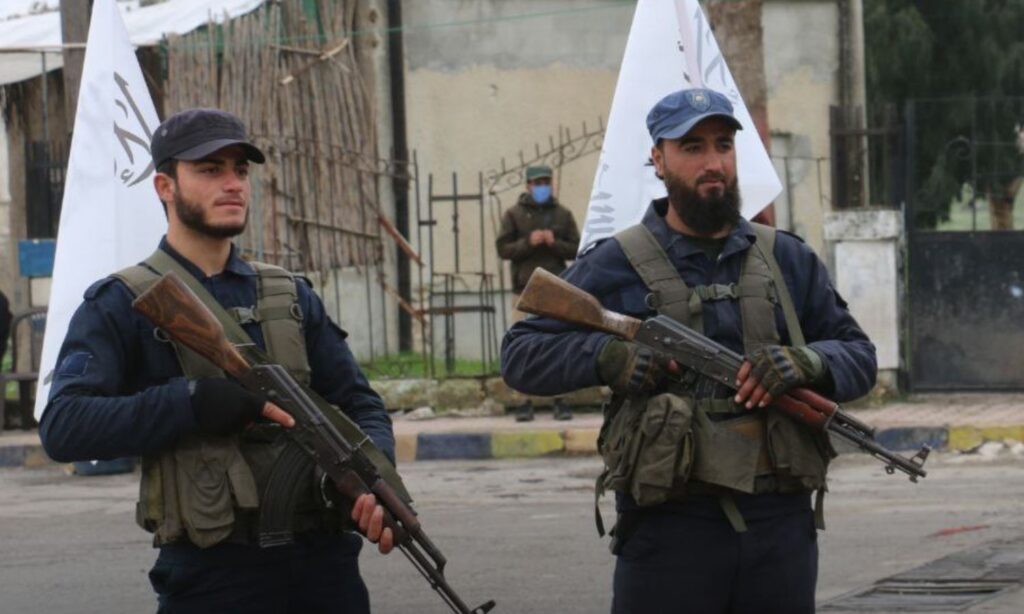
The “Salvation” government operating in the city of Idlib issued a decision to create an administration called the “Public Security Administration” that operates under the supervision of the Ministry of Interior, in the wake of the demonstrations that criticized the “General Security Service” in Idlib.
The decision issued on Wednesday, March 20, stipulated the creation of the administration and the naming of its director by a decision from the Prime Minister and based on a proposal from the Minister of the Interior.
The administration is attached to the internal regulations of the Ministry, and the expenses resulting from this decision are paid from the funds allocated to the Ministry of Interior, according to the decision.
Reformation
The Minister of Interior in the “Salvation” government, Muhammad Abd al-Rahman, explained to Enab Baladi that the new administration is not an alternative or an update to the “General Security Apparatus,” pointing out that it is a restructuring of the “General Security Apparatus” within the ministry.
He said that this administration is the authority responsible for the work that was previously entrusted to the “General Security Service” as a specialized authority in terms of pursuing “ISIS” cells, as well as “regime agents,” kidnapping cells, armed robbery, and the like.
Abdul Rahman stated that all these works have come under the Ministry’s supervision in the security aspect within the newly created administration.
He added that the decision resulted from the need at this stage to frame the entire police and security tasks within one ministry, through guidance from the “Liberator Command” (referring to the leader of Tahrir al-Sham, “Abu Muhammad al-Julani”) during a recent conference.
The decision comes based on the outcomes of a meeting eight days ago, which brought together the leader of “Hay’at Tahrir al-Sham,” which has military control in Idlib, “Abu Muhammad al-Julani,” with military personnel, civilians, and figures in the “Salvation Government” and the “Shura Council.”
The most prominent outcomes were the restructuring of the Public Security Service within the Ministry of the Interior in “Salvation,” and “the formation of a higher advisory council of people with expertise, opinion, and expertise to consider public policies and strategic decisions in the region.”
Among the outcomes are also a call for elections for the General Shura Council in the region, the formation of the Board of Grievances and Accountability, the formation of a higher oversight body, reconsideration of economic policies, combating corruption and preventing monopoly, and activating the role of local councils and professional unions.
The decision to create the “Public Security Administration” is one of a number of promises and reforms launched by the “Commission” and its political umbrella, “Salvation,” including a general amnesty with conditions and exceptions, the formation of committees to listen to the people, and the cancellation of building fees and exempting part of them according to conditions.
These decisions coincide with demonstrations a month ago demanding the overthrow of “Abu Muhammad al-Julani” and the rejection of the policy of monopolizing the decision, especially after the revelation of torture practices that detainees were subjected to inside the “Tahrir al-Sham” prisons and a case of killing and concealment of the fate (revealed later) of a member of a military faction at the hands of “Tahrir al-Sham.” “.
The “Rescue” group, which consists of 11 ministries, controls the aspects of life in Idlib Governorate, the northern Hama countryside, and part of the western Aleppo countryside, in terms of services and administration, while “Tahrir al-Sham” controls the region indirectly, economically and in services, and this was accompanied by accusations that the “HTS” Behind many projects that were described as “ monopoly .”
“Abu Muhammad al-Julani” was at the forefront of some projects, events, and service issues in the presence of the head of the “Salvation Government” and its ministers, and he made promises to solve many problems.
